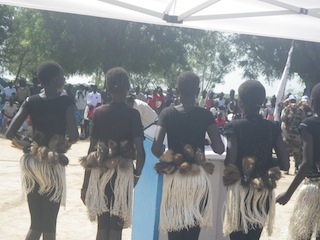Nuer elders question IGAD’s impartiality in South Sudan conflict
February 10, 2015 (ADDIS ABABA) – The Nuer Council of Elders (NCE) has issued a strong-worded statement criticising the Intergovernmental Authority on Development (IGAD) for suffering from conflict of interest and called on the regional mediation body to exercise impartiality in the 14-month old South Sudanese internal conflict.

“There is no peace that can be reached without addressing the root causes of any conflict,” partly reads the statement extended to Sudan Tribune.
The release also called on the United Nations Security Council (UNSC) to put pressure on the African Union (AU) to release the report on the findings from the investigations into the alleged atrocities committed from 15 December 2013 when the war broke out.
The statement said the Nuer community had been aggrieved as thousands of its civilian members were allegedly massacred in the first few days of the conflict by forces loyal to president Salva Kiir.
It accused IGAD of influencing the AU not to release the report about the committed war crimes and crimes against humanity.
“We discontent and question IGAD impartiality for its conflict of interest by interfering into the AUCI mandate of publishing the report,” it further reads.
President Kiir’s has also expressed disapproval to release the report, arguing this would implicate individual leaders and spoil the ongoing peace process.
IGAD has been unsuccessfully attempting to broker the peace process between president Salva Kiir’s government and armed opposition faction of the ruling Sudan Peoples’ Liberation Movement (SPLM-IO) led by former vice-president, Riek Machar.
However, Uganda which is one of IGAD’s member states playing a mediation role has directly participated in the internal war on the side of president Kiir’s government in which thousands of its troops have been involving in direct ground combats and air raids against Machar’s rebels for the past one year.
Kenya has also in the past allowed weaponry delivery from China through its Mombasa sea port to South Sudan’s government for fighting the war against the opposition forces.
Sudan, another IGAD member state from which South Sudan split in July 2011, is also accused by president Kiir’s government of supporting the South Sudanese rebels. Khartoum also accuses Juba of supporting its rebels, who have also interfered in the South Sudanese internal war.
Other East African regional countries such as Ethiopia and Rwanda are also expected to send troops to the war torn region.
South Sudanese rebels have been calling on IGAD to put pressure on Uganda to withdraw its troops per implementation of the 23 January ceasefire deal between the warring parties.
They criticise IGAD which mediates the peace talks for double standard, further accusing it of playing three contradicting roles of mediator, negotiator and war partner.
Officials from the regional body have been warning the parties to the conflict of possible measures including sanctions and military intervention should they not reach a peace agreement.
Observers say IGAD’s mediation effort is marred with competing interests and lack to enforce ceasefire agreements particularly that the region has failed reign in the two warring parties and put pressure on Uganda to withdraw its forces per the cessation of hostilities agreement.
(ST)
